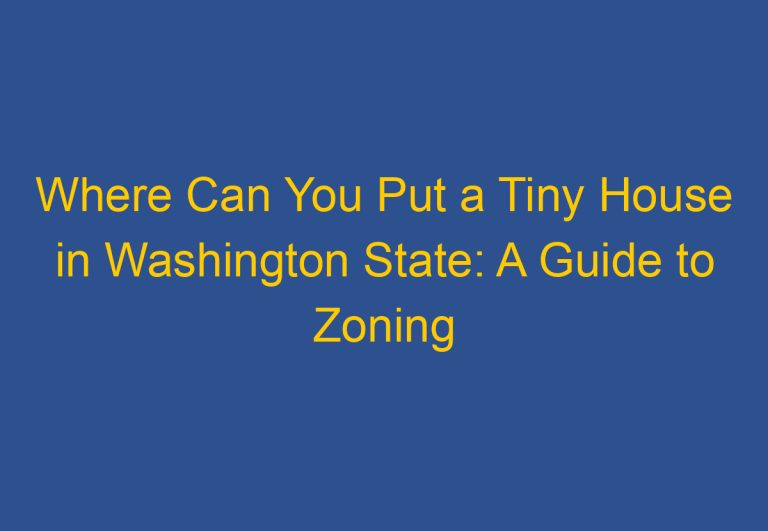Are Tiny Houses Legal in Michigan? A Comprehensive Guide to Tiny House Laws in the State
Tiny houses have become increasingly popular in recent years as a way to reduce living expenses, simplify lifestyles, and lower one’s carbon footprint. However, the legality of tiny houses varies from state to state and even from city to city. For those living in Michigan, the question of whether tiny houses are legal may come to mind.
In Michigan, tiny houses are legal, but there are certain restrictions that must be followed. According to the state’s building codes, couples must build a 250-square-foot structure, while a family of four must build a tiny house of at least 450 square feet. It is important to note that these regulations apply to permanent tiny houses, as opposed to temporary or transitional structures.
When it comes to zoning requirements, Michigan does not have specific laws governing tiny houses, leaving it up to individual cities and counties to determine their own regulations. Generally, tiny houses are subject to the same zoning regulations as traditional houses, including minimum lot size, setbacks, and height restrictions. It is important to research the local zoning requirements before building a tiny house in Michigan to ensure compliance with all regulations.
Legality and Zoning Regulations for Tiny Houses in Michigan
Understanding Michigan Zoning Laws and Tiny House Regulations
In Michigan, zoning laws and regulations determine the types of structures that are allowed in different areas. Tiny homes are legal in Michigan, but they must comply with all local building codes and zoning requirements. The state’s tiny house law allows couples to build a home of about 250 square feet, while houses for families of four must be at least 450 square feet. However, individuals must comply with minimum size requirements for tiny houses, which is 70 square feet for a single person and 120 square feet for two people.
Building Codes and Construction Standards for Tiny Homes
Tiny homes must comply with all local building codes and construction standards in Michigan. Individuals building tiny homes must ensure that their structures meet the minimum safety requirements and are built with durable materials. Additionally, tiny homes must comply with the state’s property tax laws. Property taxes for tiny homes are based on the assessed value of the structure and the land it sits on.
Permitting Process and Land Use for Tiny Homes
Individuals building tiny homes in Michigan must obtain the necessary permits and approvals from their local communities. The permitting process for tiny homes may vary depending on the county and municipality in which the structure is being built. Additionally, individuals must comply with local zoning codes that may have further restrictions on the placement and size of tiny homes. Tiny homes can either be built onto a foundation or built on wheels, and the land use regulations may vary depending on the type of structure.
Overall, while tiny homes are legal in Michigan, individuals must comply with all local building codes, zoning requirements, and regulations. It is important to ensure that all necessary permits are obtained and that the structure is built to meet the minimum safety requirements and standards.
Tiny House Lifestyle and Community Development
Tiny House Communities and Local Initiatives
Tiny house living has become a popular lifestyle choice for many individuals and families in Michigan. As the trend continues to grow, so does the development of tiny house communities and local initiatives. These communities are designed to provide a supportive and sustainable living environment for those who choose to downsize their living space.
Several cities in Michigan, including Detroit, Ann Arbor, Grand Rapids, Lansing, and Traverse City have embraced the tiny house movement and have started to develop tiny house communities. These communities offer affordable housing options for those who are looking to live a minimalist lifestyle and reduce their carbon footprint.
One such community is located in Briley Township, where tiny houses are being used to provide affordable housing for low-income families. The community is designed to be sustainable and eco-friendly, with each house being equipped with solar panels and composting toilets.
Benefits and Challenges of Tiny House Living
Living in a tiny house offers many benefits, including reduced living expenses, a smaller environmental footprint, and the freedom to move your home wherever you want. Tiny house living also promotes a minimalist lifestyle, which can help reduce stress and increase overall happiness.
However, living in a tiny house also comes with its own set of challenges. One of the biggest challenges is finding a suitable location to park your tiny house. Zoning laws and building codes can make it difficult to find a legal place to park your home, especially in urban areas.
Another challenge is the limited living space, which requires careful planning and organization. Families with children may find it particularly challenging to live in a tiny house, as they require more space and privacy.
Despite the challenges, many individuals and families have found that tiny house living is a rewarding and fulfilling lifestyle choice. With the development of tiny house communities and local initiatives, it is becoming easier for people to embrace this lifestyle and enjoy the benefits of sustainable living.
Frequently Asked Questions
What are the zoning regulations for tiny houses in Michigan?
Zoning regulations for tiny houses in Michigan vary by county and municipality. It is important to research and understand the local zoning laws before building or parking a tiny house. Generally, tiny houses must meet all local building codes and zoning requirements. Couples can build a home of about 250 square feet, while houses for families of four must be at least 450 square feet.
Can I legally live in a tiny house on my own land in Michigan?
Yes, it is legal to live in a tiny house on your own land in Michigan, as long as the tiny house meets all local building codes and zoning requirements. It is important to research and understand the local zoning laws before building or parking a tiny house.
Are there specific building codes for tiny houses in Michigan?
Yes, there are specific building codes for tiny houses in Michigan. Tiny houses must meet all local building codes and zoning requirements. The Michigan Residential Code (MRC) applies to all residential structures, including tiny houses. It is important to research and understand the local building codes before building or parking a tiny house.
What are the legal requirements for establishing a tiny house community in Michigan?
The legal requirements for establishing a tiny house community in Michigan vary by county and municipality. It is important to research and understand the local zoning laws before establishing a tiny house community. Generally, a tiny house community must meet all local building codes and zoning requirements.
How does Michigan classify tiny houses for legal purposes?
Michigan classifies tiny houses as residential structures that are typically between 100 and 400 square feet in size. This classification helps distinguish them from traditional homes and influences various aspects, including property taxes.
What permits are needed to build a tiny house in Michigan?
The permits needed to build a tiny house in Michigan vary by county and municipality. It is important to research and understand the local building codes and permit requirements before building a tiny house. Generally, a building permit is required for the construction of a tiny house.










